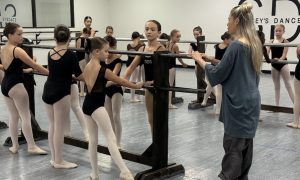Let’s say you’re at a party, and a new friend casually inquires what you do for a living. What do you say? We all wish dance could cover rent and the rest, but that’s often not the case. While a dancer is inarguably what you are, what you do to pay the bills might be something else. And you know what? That’s okay. Your passion and the majority of your profits can come separately; that doesn’t negate your validity as a dancer.
Artists know better than anyone that the working hours pass a lot faster if you like what you do. While your passion might not pay, finding a survival job that you enjoy (if not love) is worth the search. Why not use your part-time job to build skills for a second career, one that you can pursue after you retire from the stage? Building up that experience beforehand can really help smooth out your transition.
Lots of dancers find ways to stay in the dance world even after they’ve bowed out of performing. If you have a passion for teaching or choreographing, that’s a great way to spend time in the studio, both throughout your performance career and after it. More time in the studio means more opportunities to practice your craft, network with other artists, and sometimes catch an empty studio for some movement research on your own.
Others are interested in finding out about the business side of the arts, becoming the figurative (wo)man behind the curtain. You learn a lot about the workings of a studio or stage when you’re in the office with the executives. By familiarizing yourself with the ins and outs of arts administration, you can learn the system that dictates a lot of what your life is like as a dancer, from the other side of things. Knowing both worlds can help you to spot ways to runs things more efficiently, and make life a little easier on both the dancers and the administrators.
Set or costume design is another great way to stay involved in shows. While these trades require a fairly significant amount of training, they can be really rewarding ways to exercise your creativity, and stay involved in the world you love.
Ushering performances or selling merchandise for shows are also great options. Ushering at a theater gets you a free (standing) ticket to every performance that passes through. And if you’re eyeing a Broadway show that you think you’d be perfect for, what better way to learn the choreography than seeing it live every night? That’s the gig when you’re selling merch. And bonus, most of the other ushers or salespeople are likely performers, too. Voila, a networking opportunity.
On the other hand, it can sometimes be a relief to have a job that doesn’t revolve around the dance world. One that doesn’t require the utmost of your head, heart and soul in commitment, the way our passions often ask of us. There’s absolutely nothing wrong with clocking in, doing your job, clocking out, and heading to the studio or theater to do what you really want to be doing. You’re allowed to conserve your energy for what you want to spend it on, so long as you meet the expectations of the job you’re hired for.
Good options include fitness, yoga, or pilates instruction. Most of these require a fee for a 200-hour training course, but there’s also more money to be made in these fields. You get the added bonus of constantly cross-training!
Can you believe we’ve gotten this far in the article without mentioning waiting tables? This classic survival job is famous for a reason. The industry is relatively easy to get in to, and you can make good money in tips (just like commission in retail.) It’s also possible to get your shift covered if an audition should suddenly pop up on your calendar. Beware, though, you’re going to be on your feet, on the move, and working long and late hours. Wear good shoes.
What you don’t want is to be committed to a survival job that drains you. If meeting the expectations of your survival job leaves you too exhausted (be it physically, mentally, or emotionally) to put the effort needed into your dancing, then it’s defeated its purpose. You’re working a gig to support your dance career, and the minute it stops doing that, it’s time to re-evaluate. Unless your survival job has caught your interest and inspiration! Passions can change.
With the dawn of the internet came the possibility of working remotely. There are all sorts of jobs that you can do from the comfort of your own home (and really, where else would you rather be after a long day of rehearsals?). Were you a whiz kid in English class at school? Companies like Prompt hire people like you to edit student essays. With apps like Rover and Wag, you can run a dog walking business from your own front door (fur therapy!).
Having a survival job to help pay rent, bills, loans or to build a rainy day fund does not undermine your status as a career dancer. Feel free to send this article to anyone who thinks that makes your dance career a “hobby.” In a growing gig economy, cradle to grave careers are becoming more and more rare in any industry, not just dance. Being versatile in the workforce is only going to help you, and it gives you a chance to pursue and develop interests and skills as you see fit. When you’re asked at parties what you do for a living, tell them you’re a professional dancer. Someone convinced me of this in a short conversation that had a big impact in my life:
“You dance, don’t you?”
“Yes.”
“And they pay you for it?”
“Well, yes.”
“Congratulations, you’re a professional dancer.”
By Holly LaRoche of Dance Informa.















